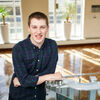
Matt Quinn
- Course: BA History
What made you want to study History at Leeds?
I knew as soon as I had my first open day that Leeds was the right place for me. I loved the campus and all of the people that I met were so friendly and welcoming. Nowhere else offered the same combination of a great academic university and department and such a vibrant city and campus.
What is it that makes you passionate about History?
I don’t think that you can properly understand the present without first understanding the past. Equally there is a lot to learn from the mistakes of the past so history is very important. My special subject and dissertation for example are both on the Troubles in Northern Ireland, which is extremely relevant to the current state of Northern Irish politics and also featured in the news recently around the Birmingham pub bombings.
Which History modules have you particularly enjoyed studying, and why?
My favourite module at Leeds was definitely 20th Century Britain: Progress and Uncertainty with Alan McLeod, although I have enjoyed all of my modules here. This module really covered a subject area I enjoyed studying and developed on knowledge I already had. That said, studying new areas that I hadn’t done at school like Most Christian Kings: France, 1515-1715, was really refreshing.
Which Discovery Modules have you studied, and how do you feel they have enhanced your time in Leeds?
In first year I studied International Politics in the Politics department and Biology of the Mind in the school of Biology. International Politics linked quite nicely into my degree, especially in my modules on the twentieth century, whereas Biology of the Mind allowed me to discover more about a topic I had really enjoyed at school. In second year I chose to do two economics modules, with one specifically covering economic policy in post-war Britain, which gave me knowledge I then used in my work on the 20th Century Britain module. In hindsight though, I do wish I had taken up the opportunity to do a language discovery module as university is such a good opportunity to learn.
What would you say about the library and study facilities at the University?
The library facilities here are brilliant, especially the volume of articles and books that are accessible online. Having three libraries also gives you lots of places to study if you have trouble working at home, especially since the redevelopment of Edward Boyle and the basically new Laidlaw.
What activities have you been involved in outside of your course and what have you got out of being involved?
History Society has been the main society I’ve been involved in and is a really fantastic way of meeting other people from the course. With them I’ve gone to Budapest and Berlin, with Prague on the agenda this year, and they’ve run lots of socials too. I’ve also become treasurer of Action society this year, a charity that runs projects to help the elderly and disadvantaged young people in Leeds. There are so many societies though that the best bet is trying it out in the give it a go program, where societies run one off sessions so you can try anything from Ultimate Frisbee to Kayaking.
What would you say about Leeds as a city and how do you think it has helped you make the most of your time here?
Leeds wouldn’t have been a city I’d ever thought of before coming to uni but it has been the perfect university city. There are so many students in Leeds to start with so there are loads of events specifically aimed at students. It’s got something that will suit everybody and having such a big city right on the edge of the university also gives the opportunity to have a part-time job there.
Do you have any comments about the support you receive from the School of History?
Through personal tutoring and the student education service team, the school offers a very good support system for anyone having personal difficulties. In terms of employability, there is lots of guidance available from the school and the events that they run, such as EXPO where the school gets in lots of different public speakers from various sectors, are really helpful.
What do you plan to do once you’ve finished your course, and how do you think the skills and knowledge you’ve developed at Leeds will help with these plans?
Who knows! I’m still struggling to decide what to do next but I know that the skills I have learnt from my History degree will help me in whatever career I choose. My time here has also really helped me improve my confidence which will help me lots when I get to the interview stage of applications. I also have much more to talk about now because of the number of opportunities that I have taken advantage of that only a university of Leeds scale presents.
What would you say to anyone thinking of applying to your course?
Do it. Leeds offers such a great mix of brilliant teaching and a campus where something is always going on that you won’t regret applying here.

